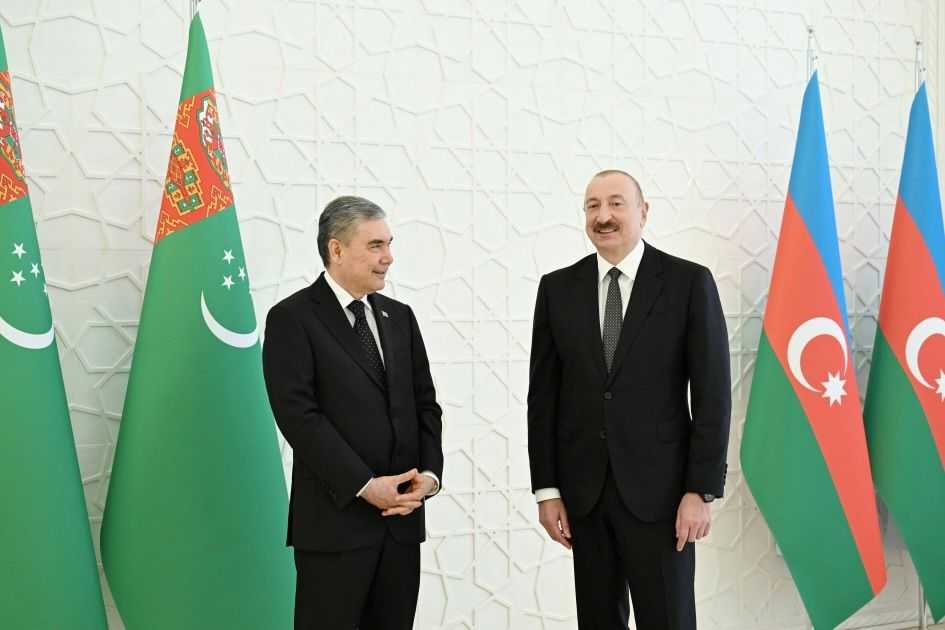
Around a dozen independent journalists marched on Wednesday around the National Press Council building in Baku to mark National Press Day. The journalists were demanding the resignation of the council’s head, Aflatun Amashov, arguing that the organisation was ‘meaningless’ given Azerbaijan’s lack of media freedom.
Azerbaijan is frequently singled out among international rights groups as being among the worst countries in the world in terms of press freedom.
Avaz Hafizli, one of the protesters and a journalist at news site Azad Soz (‘free speech’), told OC Media that the protest was attended by journalists from outlets including the Aztimes, Azel TV, Kanal 13, Shirvaninfo, Dogru TV, Azad Media TV and Facebook page ‘Korrupsiyaya Yox De’ (‘say no to corruption’).
Hafizli told reporters during the protest that the council did not help journalists in need.
‘The Azerbaijani Press Council has not supported any independent journalist facing pressure, and hasn’t made any statement [against such actions]. We haven’t observed that,’ he said.
‘Most importantly, when during the [Covid-19] pandemic the Operational Headquarters stopped the work of independent journalists, why did the Press Council not make a statement that the work of journalists should not be stopped? Why had the work of other, pro-governmental TV channels not stopped?’
According to a 9 June decision by the Operational Headquarters, the body coordinating Azerbaijan’s response to the virus, journalists must notify the authorities before leaving their homes.
According to Radio Azadliq, this decision mostly affected journalists from independent media outlets including themselves, Meydan TV, Toplum TV, and news agency Turan.
‘If the Press Council cannot support us, why do we need the Press Council? […] Aflatun Amashov, if you can’t do your job properly, then resign and go’, Hafizli added.
The journalists chanted ‘Journalism is not a crime!’, ‘Free media can not be silenced’, and ‘Resignation!’.
Another of the journalists protesting, Parvin Abishova from Aztimes, talked about the pressure that journalists in Azerbaijan face.
‘We are journalists, we don’t have any personal interests, we only want to deliver the social problems of the population to the appropriate bodies. But we are being blackened, we are presented as the opposition, as the people’s enemy’, she said.
Hafizli told OC Media that the journalists wanted to talk with Amashov but that he did not come out to meet them.
Last year’s National Press Day in Azerbaijan was also marked with a protest outside the Press Council.
[Read more on OC Media: Journalist detained in Baku on National Press Day]
Media freedom in Azerbaijan
International Press freedom in Azerbaijan is frequently cited by watchdog groups as being amongst the worst in the world.
In Reporters Without Borders’ 2020 press freedom index, Azerbaijan ranked 168 out of 180 countries.
In their 2020 report, the European Federation of Journalists singled out Azerbaijan as among ‘three of the biggest media freedom violators’ in Europe, along with Turkey and Russia.
In January, shortly before the snap parliamentary elections, a group of prominent independent journalists in Azerbaijan warned that a ‘nearly decade-old crackdown on press freedom is only becoming more acute’.
Journalists were also attacked, pressured, and intimidated before, during, and after municipal elections in December and parliamentary elections in February.
New restrictions on media freedom also came into force as the COVID-19 pandemic hit the country, with the authorities detaining journalists and bloggers.
Pressure on journalists during the pandemic was condemned by many international organisations, including the Parliamentary Assembly of the Council of Europe, the OSCE, IFEX, Amnesty International, and others.
On 17 March, the Azerbaijani Parliament adopted new amendments to the Law on Information with restrictions on publishing ‘false’ information online. The OSCE later ‘expressed their concern’ regarding the amendments.
‘I fully understand the need to combat false information during a health emergency,’ then-OSCE Representative on Freedom of the Media, Harlem Désir, said at the time.
‘But the amendment to the law on information, which aims to combat the publication of false information that poses a threat to the life and health of the population and seeks to avoid panic, should not impede the work of journalists and their ability to report on the pandemic.’
Désir’s reappointment to the position was blocked by Azerbaijan and Tajikistan after his mandate expired on 19 July.
Many independent media outlets covering Azerbaijan have moved their offices abroad, with the websites of several of them being blocked in the country, including the Berlin-based Meydan TV, RFE/RL, Voice of America, the BBC, and newspaper Azadliq.
In June, the government announced their intention to block programmes intended to circumvent the blocks of other websites.







